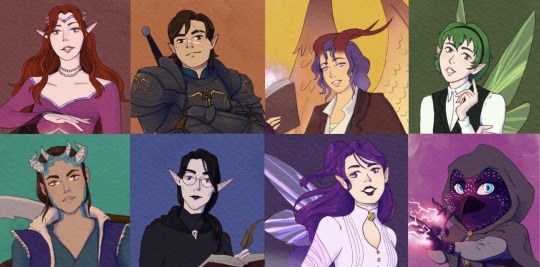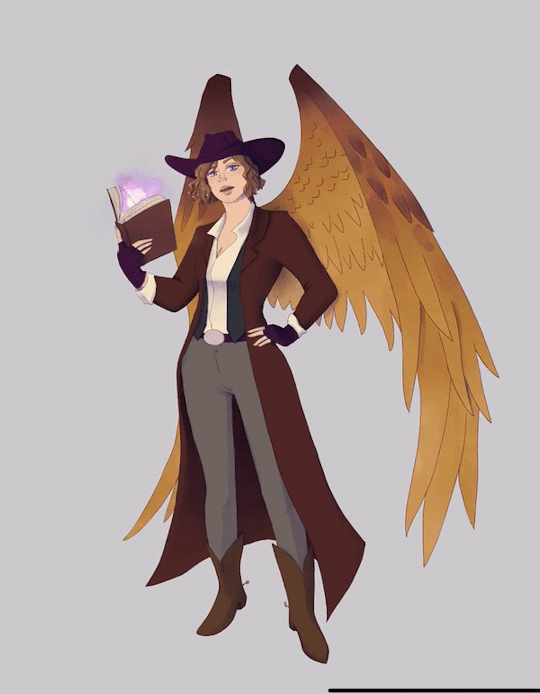#gentlefolk saga
Explore tagged Tumblr posts
Text

sketch of the day! a silly lil Yvette Rane (they/them) from The Gentlefolk Saga
#blorbo from my brain#blorbo from my dnd#mint draws#mint.draws#art#my art#drawing#art wip#dnd#sketch#daily sketch#sketchbook#yvette rane#gentlefolk saga#the gentlefolk saga#records of the realms#dnd charcter art#dnd pc#dnd oc#dnd campaign#dnd5e#dnd character
5 notes
·
View notes
Text


✨ character development ✨
Original art by me
#Kenku#5e#dnd#dnd character#character art#original character#Maybe the Kenku#bard#cleric#sorcerer#warlock#records of the realms#the gentlefolk saga#this poor bird child has seen too much#my art
19 notes
·
View notes
Text
This Saturday we’re throwing our Gentlefolk into a feywild game. Think they’ll come out the other side unscathed?
Join us Saturday, November 12th at 3pm EST at twitch.tv/recordsoftherealms to witness the finale
Character art by @mello-ette
#dnd#dungeons and dragons#dnd stream#actual play#the gentlefolk saga#finale#dnd campaign#homebrew campaign#original characters#feywild#fey#fey games
10 notes
·
View notes
Note
could someone write fic about your fic? also is it officially a trilogy? (asking because on AO3 they aren't listed as parts of a series)
It needs a better name than ‘Jonathan Harker and His Adventures with Weird Old Guys feat. Their Issues’ but yes, I consider it a trilogy. (Especially since I’m NOT about to top this last brick)
Also, by all means write fic of my fic about a comic that doesn’t exist! Goncharovception this thing, friend!
#I guess I should get around to labeling the three as a proper saga but#I am Tired and Christmasing right now#I’ll get to it#the league of extraordinary gentlefolk#my writing
5 notes
·
View notes
Text
St. Thomas Becket - Iconic Saint of The 12th Century - Dec 29th

Thomas Becket , Saint, martyr, Archbishop of Canterbury, b. at London, December 21, 1118 (?); d. at Canterbury, December 29, 1170. St. Thomas was born of parents who, coming from Normandy, had settled in England some years previously. No reliance can be placed upon the legend that his mother was a Saracen. In after life his humble birth was made the subject of spiteful comment, though his parents were not peasants, but people of some mark, and from his earliest years their son had been well taught and had associated with gentlefolk. He learned to read at Merton Abbey and then studied in Paris. On leaving school he employed himself in secretarial work, first with Sir Richer de l’Aigle and then with his kinsman, Osbert Huitdeniers, who was “Justiciar” of London. Somewhere about the year 1141, under circumstances that are variously related, he entered the service of Theobald, Archbishop of Canterbury, and in that household he won his master’s favor and eventually became the most trusted of all his clerks. A description embodied in the Icelandic Saga and derived probably from Robert of Cricklade gives a vivid portrait of him at this period.
“To look upon he was slim of growth and pale of hue, with dark hair, a long nose, and a straightly featured face. Blithe of countenance was he, winning and loveable in his conversation, frank of speech in his discourses, but slightly stuttering in his talk, so keen of discernment and understanding that he could always make difficult questions plain after a wise manner.”
Theobald recognized his capacity, made use of him in many delicate negotiations, and after allowing him to go for a year to study civil and canon law at Bologna and Auxerre, ordained him deacon in 1154, after bestowing upon him several preferments, the most important of which was the Archdeaconry of Canterbury (see Radford, “Thomas of London“, p. 53).

It was just at this period that King Stephen died and the young monarch Henry II became unquestioned master of the kingdom. He took “Thomas of London“, as Becket was then most commonly called, for his chancellor, and in that office Thomas at the age of thirty-six became, with the possible exception of the justiciar, the most powerful subject in Henry’s wide dominions. The chroniclers speak with wonder of the relations which existed between the chancellor and the sovereign, who was twelve years his junior. People declared that “they had but one heart and one mind”. Often the king and his minister behaved like two schoolboys at play. But although they hunted or rode at the head of an army together it was no mere comradeship in pastime which united them. Both were hard workers, and both, we may believe, had the prosperity of the kingdom deeply at heart. Whether the chancellor, who was after all the elder man, was the true originator of the administrative reforms which Henry introduced cannot now be clearly determined. In many matters they saw eye to eye. The king’s imperial views and love of splendor were quite to the taste of his minister. When Thomas went to France in 1158 to negotiate a marriage treaty, he travelled with such pomp that the people said: “If this be only the chancellor what must be the glory of the king himself?”
In 1153 Thomas acted as justice itinerant in three counties. In 1159 he seems to have been the chief organizer of Henry’s expedition to Toulouse, upon which he accompanied him, and though it seems to be untrue that the impost of “scutage” was called into existence for that occasion (Round, “Feudal England“, 268-73), still Thomas undoubtedly pressed on the exaction of this money contribution in lieu of military service and enforced it against ecclesiastics in such a way that bitter complaints were made of the disproportionately heavy burden thus imposed upon the Church. In the military operations Thomas took a leading part, and Garnier, a French chronicler, who lived to write of the virtues of St. Thomas and his martyrdom, declares that in these encounters he saw him unhorse many French knights. Deacon though he was, he led the most daring attacks in person, and Edward Grim also gives us to understand that in laying waste the enemy’s country with fire and sword the chancellor’s principles did not materially differ from those of the other commanders of his time. But although, as men then reported, “he put off the archdeacon”, in this and other ways, he was very far from assuming the licentious manners of those around him. No word was ever breathed against his personal purity. Foul conduct or foul speech, lying or unchastity were hateful to him, and on occasion he punished them severely. He seems at all times to have had clear principles with regard to the claims of the Church, and even during this period of his chancellorship he more than once risked Henry’s grievous displeasure. For example, he opposed the dispensation which Henry for political reasons extorted from the pope, and strove to prevent the marriage of Mary, Abbess of Romsey, to Matthew of Boulogne. But to the very limits of what his conscience permitted, Thomas identified himself with his master’s interests, and Tennyson is true to history when he makes the archbishop say:
I served our Theobald well when I was with him: I served King Henry well as Chancellor: I am his no more, and I must serve the Church.
Archbishop Theobald died in 1161, and in the course of the next year Henry seems to have decided that it would be good policy to prepare the way for further schemes of reform by securing the advancement of his chancellor to the primacy. Our authorities are agreed that from the first Thomas drew back in alarm. “I know your plans for the Church“, he said, “you will assert claims which I, if I were archbishop, must needs oppose.” But Henry would not be gainsaid, and Thomas at the instance of Cardinal Henry of Pisa, who urged it upon him as a service to religion, yielded in spite of his misgivings. He was ordained priest on Saturday in Whitweek and consecrated bishop the next day, Sunday, June 3, 1162. It seems to have been St. Thomas who obtained for England the privilege of keeping the feast of the Blessed Trinity on that Sunday, the anniversary of his consecration, and more than a century afterwards this custom was adopted by the papal Court itself and eventually imposed upon the whole world.
A great change took place in the saint’s way of life after his consecration as archbishop. Even as chancellor he had practiced secret austerities, but now in view of the struggle he clearly saw before him he gave himself to fastings and disciplines, hair shirts, protracted vigils, and constant prayers. Before the end of the year 1162 he stripped himself of all signs of the lavish display which he had previously affected. On August 10 he went barefoot to receive the envoy who brought him the pallium from Rome. Contrary to the king’s wish he resigned the chancellorship. Whereupon Henry seems to have required him to surrender certain ecclesiastical preferments which he still retained, notably the archdeaconry, and when this was not done at once showed bitter displeasure. Other misunderstandings soon followed. The archbishop, having, as he believed, the king’s express permission, set about to reclaim alienated estates belonging to his see, a procedure which again gave offense. Still more serious was the open resistance which he made to the king’s proposal that a voluntary offering to the sheriffs should be paid into the royal treasury. As the first recorded instance of any determined opposition to the king’s arbitrary will in a matter of taxation, the incident is of much constitutional importance. The saint’s protest seems to have been successful, but the relations with the king only grew more strained.

Soon after this the great matter of dispute was reached in the resistance made by Thomas to the king’s officials when they attempted to assert jurisdiction over criminous clerks. The question has been dealt with in some detail in the article England (V, 436). That the saint himself had no wish to be lenient with criminous clerks has been well shown by Norgate (Angevin Kings, ii, 22). It was with him simply a question of principle. St. Thomas seems all along to have suspected Henry of a design to strike at the independence of what the king regarded as a too powerful Church. With this view Henry summoned the bishops at Westminster (October 1, 1163) to sanction certain as yet unspecified articles which he called his grandfather’s customs (avitoe consuetudines), one of the known objects of which was to bring clerics guilty of crimes under the jurisdiction of the secular courts. The other bishops, as the demand was still in the vague, showed a willingness to submit, though with the condition “saving our order”, upon which St. Thomas inflexibly insisted. The king’s resentment was thereupon manifested by requiring the archbishop to surrender certain castles he had hitherto retained, and by other acts of unfriendliness. In deference to what he believed to be the pope’s wish, the archbishop in December consented to make some concessions by giving a personal and private undertaking to the king to obey his customs “loyally and in good faith”. But when Henry shortly afterwards at Clarendon (January 13, 1164) sought to draw the saint on to a formal and public acceptance of the “Constitutions of Clarendon”, under which name the sixteen articles, the avitoe consuetudines as finally drafted, have been commonly known, St. Thomas, though at first yielding somewhat to the solicitations of the other bishops, in the end took up an attitude of uncompromising resistance.
Then followed a period of unworthy and vindictive persecution. When opposing a claim made against him by John the Marshal, Thomas upon a frivolous pretext was found guilty of contempt of court. For this he was sentenced to pay £500; other demands for large sums of money followed, and finally, though a complete release of all claims against him as chancellor had been given on his becoming archbishop, he was required to render an account of nearly all the moneys which had passed through his hands in his discharge of the office. Eventually a sum of nearly £30,000 was demanded of him. His fellow bishops, summoned by Henry to a council at Northampton, implored him to throw himself unreservedly upon the king’s mercy, but St. Thomas, instead of yielding, solemnly warned them and threatened them. Then, after celebrating Mass, he took his archiepiscopal cross into his own hand and presented himself thus in the royal council chamber. The king demanded that sentence should be passed upon him, but in the confusion and discussion which ensued the saint with uplifted cross made his way out through the mob of angry courtiers. He fled away secretly that night (October 13, 1164), sailed in disguise from Sandwich (November 2), and, after being cordially welcomed by Louis VII of France, he threw himself at the feet of Pope Alexander III, then at Sens, on November 23 The pope, who had given a cold reception to certain episcopal envoys sent by Henry, welcomed the saint very kindly, and refused to accept his resignation of his see. On November 30, Thomas went to take up his residence at the Cistercian Abbey of Pontigny in Burgundy, though he was compelled to leave this refuge a year later, as Henry, after confiscating the archbishop’s property and banishing all the Becket kinsfolk, threatened to wreak his vengeance on the whole Cistercian Order if they continued to harbor him.

The negotiations between Henry, the pope, and the archbishop dragged on for the next four years without the position being sensibly changed. Although the saint remained firm in his resistance to the principle of the Constitutions of Clarendon, he was willing to make any concessions that could be reasonably asked of him, and on January 6, 1169, when the kings of England and France were in conference at Montmirail, he threw himself at Henry’s feet, but as he still refused to accept the obnoxious customs Henry repulsed him. At last in 1170 some sort of reconciliation was patched up. The question of the customs was not mentioned and Henry professed himself willing to be guided by the archbishop’s council as to amends due to the See of Canterbury for the recent violation of its rights in the crowning of Henry’s son by the Archbishop of York. On December 1, 1170, St. Thomas again landed in England, and was received with every demonstration of popular enthusiasm. But trouble almost immediately occurred in connection with the absolution of two of the bishops, whose sentence of excommunication St. Thomas had brought with him, as well as over the restoration by the de Broc family of the archbishop’s castle at Saltwood. How far Henry was directly responsible for the tragedy which soon after occurred on December 29 is not quite clear. Four knights who came from France demanded the absolution of the bishops. St. Thomas would not comply. They left for a space, but came back at Vesper time with a band of armed men. To their angry question, “Where is the traitor?” the saint boldly replied, “Here I am, no traitor, but archbishop and priest of God.” They tried to drag him from the church, but were unable, and in the end they slew him where he stood, scattering his brains on the pavement. His faithful companion, Edward Grim, who bore his cross, was wounded in the struggle.

A tremendous reaction of feeling followed this deed of blood. In an extraordinarily brief space of time devotion to the martyred archbishop had spread all through Europe. The pope promulgated the bull of canonization, little more than two years after the martyrdom, February 21, 1173. On July 12, 1174, Henry II did public penance, and was scourged at the archbishop’s tomb. An immense number of miracles were worked, and for the rest of the Middle Ages the shrine of St. Thomas of Canterbury was one of the wealthiest and most famous in Europe. The martyr’s holy remains are believed to have been destroyed in September, 1538, when nearly all the other shrines in England were dismantled; but the matter is by no means clear, and, although the weight of learned opinion is adverse, there are still those who believe that a skeleton found in the crypt in January, 1888, is the body of St. Thomas. The story that Henry VIII in 1538 summoned the archbishop to stand his trial for high treason, and that when, in June, 1538, the trial had been held and the accused pronounced contumacious, the body was ordered to be disinterred and burnt, is probably apocryphal.
HERBERT THURSTON
source: https://www.catholic.com/encyclopedia/thomas-becket-saint
75 notes
·
View notes
Text
My mom is trying to make me talk to my dad, and, while that may not sound bad for those of you who are new to my damiens being angsty again parent edition saga, i assure you, he sucks and i have a bunch of screenshots and quotes to prove it, last time on damiens being angsty again parent edition, he threatened to destroy my devices in the midst of a pandemic and in the episode before that he told me to prove i had depression by self harming or committing suicide, and now in this episode my mom is telling me the only way to get my hair cut is through him, and for me its either have a chance at some form of self expression and gender euphoria at the cost of my sanity and mental health or keep my sanity but have about 37 breakdowns every time i shower there for hurting my mental health again. I just want to reiterate that my mom knows damn well the shit i put up with but doesn’t care. This, dear gentlefolk, has been another episode of damiens being angsty parent edition
20 notes
·
View notes
Text
Wow it has been a time tonight my good gentlefolk...
LONG POST SO STRAP IN KIDS.
I rewatched Twilight.
Yes. Full stop.
After finishing Midnight Sun, I’ve just been on a whirlwind nostalgia binge while simultaneously using my heightened 22 year old critical thinking to roast tf out of every bit of Twilight saga and SMeyer content I’ve come across...
after having rewatched that film in full, not just in random snippets of my favourite scenes {see: training montage where it’s just Jasper talking the entire time in Eclipse}, for the first time since I think that initial fever faze between 2009-2011... I can say with certainty now... both 10-11 year old me, and 22 year old me enjoy Twilight. Both movie and book. Unlike the films, I think I reread the books multiple times between 2008-2013... so I can say that I enjoyed it.
However, as I have come to be far too practiced in, I have separated the art from the artist. Smeyer is racist, misogynistic trash who doesn’t know how to keep consistent characterisation or understands the GOLDMINE of incredible stories in Rosalie, Alice and Jasper, Carlisle pre-Edward... like fuck I would die if we got Carlisle struggling to reconcile his monster self with his desire to do good in the world like holy shit... Alice waking up in that cell or pit or wherever tf it was and using her visions to guide her to Jasper and then the Cullens??? Hell fucking yes!! ROSALIE BEING A BADASS MECHANIC BUT ALSO THE QUEEN OF CONSENT WHO KILLED HER RAPISTS... she hates Rosalie and Jessica and I will not stand for this bullshit... Rosalie and Edward are BROTHER AND SISTER and this weird awkward hateful relationship they end up having is utter nonsense... and my god, CHARLIE... Charlie would never. Ever. Have congratulated Jacob for kissing Bella without her consent. Point blank. But ESPECIALLY when she was so upset about it. AND BROKE HER HAND BECAUSE OF IT. in this way, Movie!Charlie aka Billy Burke remains top tier...
And my god just the utter hatred and exploitation of the Quileute tribe who are a REAL TRIBE SHE DECIDED SHE WANTED TO USE TO FUNNEL ALL OF HER HATRED TOWARDS... fuck that and fuck you smeyer.

Fuck you.

This is great. https://quileutenation.org/
Was trying to figure out if the Move to Higher Grounds funding was still ongoing but wasn’t sure. Here’s the link anyway, just in case it’s still open. https://mthg.org/ give that Midnight Sun money (that you can rip off the Internet) to this very small community who got exploited but didn’t see a cent of Twilight money =_=
https://mthg.org/
But anyway I was talking about how I enjoy Twilight. 10-11 year old was caught in the sappy romance back in the day. Even then in 2009-10 the whole stigma against Twilight was sinking in so I never fully leaned into the fangirl but I was fairly invested in the series.
I watched all the movies except I think BD pt. 2 in cinemas (again the Twilight fatigue had truly settled in by that point). I somehow ended up watching New Moon twice (first time bc the whole fam went. Second time bc my mum couldn’t focus bc my at the time toddler sister was distracting her). Which really, equally as angsty as Twilight, tho tbh haven’t watched that in a while either (maybe since I first watched it) so tbd on that rewatch y’all. I think it might’ve been my least favourite one... bc I always skip to Eclipse whenever I rewatch stuff (I can say that Eclipse was probably 2014-2015 in full) bc I would argue that’s my favourite of the movies... mostly bc of Jasper XD.
(Yes he was a Confederate soldier. Another hideous detail Smeyer chose to include. I choose to believe, like many men of that time and other wartimes, was swayed by the South’s missive and the lusty lure of proving yourself in battle that ended up taking many young lives who didn’t know wtf they were doing... and current Jasper knows better, which would parallel his toxic relationship with Maria and her ambition to conquer the South with her newborns... ALSO YO SMEYER WHY TF SHE HAVE TO BE MEXICAN/LATINA???? WHY TF WAS THAT NECESSARY??!?! Had to make the one Mexican vampire a horrible, manipulative seductress huh)
So yeah. 22 year old me still enjoys it. It’s not a good book or series by any means. It’s not well written or consistent at all. How did Jacob become such an asshole BUT YOURE GONNA TELL ME 15 YEARS AFTER THE FACT THAT EDWARD THINKS JACOB’S THOUGHTS ARE PURE AND HE LIKES LISTENING TO HIM????
But getting to criticise this series while simultaneously recognising every single scene that made my heart flutter back in the day just enhances my experience as a whole. As well as using my apparently much better imagination than Smeyer to dream up much better stories for the rest of the Cullens WHO WERE PROBABLY THE ONLY APPEALS OF MIDNIGHT SUN.
Also what a fucking depressing way to end that book. With Edward resolved to leave Bella at any given moment. *sigh*
Anyway. 7 nostalgia points out of 10. 4 critical points out of 10. 6/10 overall bc of what could’ve been if smeyer was a better person.
And fuck your for having a cameo in the first movie and the wedding scene in BD pt. 1. If I see you in the others imma scream.
Shit this was a rant.
1 note
·
View note
Text
2021 (8)
three days on the cross (wahome mutahi) - 9/10 gosta berling’s saga (selma lagerlof) - 7/10 masks (fumiko enchi) - 7/10 oracle night (paul auster) - 6/10 i lock my door upon myself (joyce carol oates) - 7/10 a house of gentlefolk (ivan turgenev) - 7/10 the ballad of the sad cafe (carson mccullers) - 10/10 something i've been meaning to tell you (alice munro) - 9/10
0 notes
Text


Yvette Rane (they/them)
just under 700 years old
High Elf Necromancy Wizard
My D&D PC from The Gentlefolk Saga
(wow am i actually going to start posting my art?? in places??? inconceivable)
#we’ll im doing more art might as well put it somewhere#this is one of my DND blorbos#ignore that they’re nakey#my art#mint.draws#mint draws#art#blorbo from my dnd#blorbo from my mind#dnd#dnd art#dnd character#high elf#yvette#yvette rane#gentlefolk#gentlefolk saga#the gentlefolk saga#dungeons and dragons#d&d#d&d oc#dnd oc#dnd pc#d&d pc#d&d art
7 notes
·
View notes
Text
A Gentle Recap
If you’re joining us this Saturday it might be helpful to have some context. After all, our Gentlefolk have come a long way since the start of their journey.
Welcome wanderers to the world of Vagari. In this world there are cities with unspeakable names, gods whose powers are passed down to them from their predecessors, and mysterious entities bearing white masks who work in plain sight to weave the threads of fate - for better, or for worse.
There are many adventurers across Vagari, most having their adventures almost simultaneously. But for this band of Gentlefolk we travel back in time by about 5 years from the main stories.
For the continuation of our tale this year, we pick up one year after an intense airship battle with a mysterious and murderous changeling simulacrum known as Pent. After releasing his wizard prisoner Teo Castrovel, our patchwork band of heroes Sid, Yvette, Maybe, Bells, Solara, Sprig, and Lyra, seemed to be out of the woods and onto more calm solo adventures.

The Gentlefolk party present day from top left to bottom right - Lyra, Sid, Bliss, Sprig, Solara, Yvette, Bells, Maybe. Art by @mello-ette

We opened our season with a summer festival in the City of Sea and Sky on Toernsele (torn sail) Islet - a place many of our hero’s have now come to call home. A tense reunion is had between Bells, Sprig, Lyra, Yvette and Yvette’s partner Sid. Sid has a new friend in tow, an Aasimar Wizard who goes by Kinde - and she doesn’t make the best first impression.

Above - Kinde the Aasimar Wizard. Art by @mello-ette
With emotions already simmering, things really begin to blow up when the city is, well, literally blown up by an adversary who our hero’s believe they met before on an airship not too long ago. It turns out they’re *somewhat* correct, as we’re introduced to Phennil- a changeling simulacrum like Pent, but with his own unique sparkling and murderous personality.

Above - Phennil (pronounced: Fennel) the BBEG. Art by kabukikid on Instagram
A lot of damage is done to the city. Loved ones are lost in the chaos of the fire and in attempt to protect citizens, including beloved partner to Lyra, Helath. Sprig makes the desperate sacrifice of offering her true fey name to Phennil to spare the life of her lover Bawra. Bells, being protective of their twin, tearfully departs from the group into the feywild to try to undo Sprig’s mistake.
With the help of local crime boss the Ivory Queen, the remaining group leaves the city and heads for Malwrend Mine - believing they may find answers to Phennil’s identity/ originator, answers to missing party child Maybe’s whereabouts, and wanting vengeance for the damage done to the city. We make a brief stop on an island where asking questions could literally kill you. And Sprig accidentally gets a shop keep decapitated.
At the mine itself we battled off shadowy necrotic creatures, find a portal to the Shadowfell and discover the final resting place of Sid’s god before he ascended into godhood and took on the mantle of Kelemvor. It’s also revealed that Kinde isn’t from this dimension, she’s from the same one as Teo Castrovel and she claims to need his help to get home. But she has to be careful about how much detail she reveals and avoid running into this dimension’s version of herself.
Finding not much else in the way of information, being rejoined by a spectral version of Bells, and realizing Kinde’s girlfriend is en route to the now dangerous City of Sea and Sky - the group heads back to Toernsele Islet and makes their way to the new meetup point of Slurry Falls - a popular tourist spot for Muckboarding. Along the way, Sprig loses some of her magic from trying to contact Maybe one too many times. It’s confirmed that Maybe is under Phennil’s watch at this point.
Our hero’s allow themselves maybe 20 minutes of levity before it all goes horribly wrong. Kinde and her girlfriend become petrified and start sinking into the mud while draconic entities start attacking from the depths of Avernus at the behest of Tiamat, trying to clear a portal for their tyrannical queen. At the battle’s conclusion Kinde’s real identity is revealed as Bliss - a young monk the group met last year. Only as she said before at the mine, she’s from a different dimension. She explains that some of what she told the group is true, but she’s here to retrieve her father, Teo Castrovel. She also blames herself for Tiamat’s attempt to take over this material plane, as they have a history where she accepted magic from the Dragon Queen in while traveling through Avernus.

From Kinde to Bliss. Art by @mello-ette
After this chaos, our group realizes another simulacrum like Pent and Phennil has been watching this group and recording information about us - Pnuema. Most of the party is in immediate defense mode, ready to kill her and flee, but Yvette is able to learn about Pnuema’s origins and determine she’s not a threat for now. Pnuema is one of 60+ simulacrum tasked with watching over the world of Vagari, and possibly other realms. Pent and Phennil are particular outliers who are known for their murderous streaks, yet no one does anything about them.
Meanwhile, Bells efforts to have Sprig’s name changed and free her from Phennils control are being heavily blocked by Phennil himself, using Maybe in tow to quote Sprig out of context and say she ended the life of a fey court representative’s daughter. Realizing they can’t do this alone, Bells flees to the material plane for help from their friends, and we join her in the feywild at a place called the Warren, to participate in Phennils cruel game. Contracts are rewritten, old and new friends meet, and Feywild rules are learned.
We left off at the start of this game, and Phennil summoned forth some additional participants: Maybe, Solara, Bawra Chiv, and a very young Helath reborn and accompanied by an elderly man.
#World of Vagari#Vagari Lore#the Gentlefolk Saga#recap#dnd#dnd actual play#dnd stream#dnd twitch#homebrew world#dnd homebrew#dungeons and dragons#dnd campaign
6 notes
·
View notes
Text
Quick Intro
Seems most appropriate to start with an introduction so, hi! We’re Records of the Realms. We’re a collective of mostly queer Dnd/ttrpg enthusiasts who stream our remote games on twitch! Majority of our current long running arcs/ campaigns are run by our founding GM, Vinny! But we’ve sprinkled in some limited run campaigns and one shots here and there as well and plan to do many more in the future. If you’d like to check out our streamed games so far, you can check out the youtube archive playlists below! Vagari Arcs - GMed by Vinny/Vander Elemental Extrication - Light Arc Elemental Extrication - Fire Arc: Reheated Elemental Extrication - Earth Arc: Recrystalized
The Gentlefolk Saga - A prequel campaign that precedes all the Elemental Extrication Arcs - Also GMed by Vinny/Vander Season 1 Season 2 - Takes place 1 year after the events of season 1
Blight of Ophec - GMed by Griffin One shots
#dungeons and dragons#dnd#dnd stream#ttrpg stream#ttrpg#about us#intro#records of the realms#dnd actual play#twitch stream
0 notes
Text
Today’s the day! Be advised if you are joining us for our finale we do have a content warning for part 1 with the following potential themes:
Familial Estrangement
Transphobia
Deadnaming
Child Illness
Fantasy Terrorism
Fantasy Prejudice
War/PTSD trauma
Child endangerment
Veiled self-harm/suicide conversation
These themes have been pre discussed ahead of time amongst the group and additional safety tools have been put in place to utilize during stream. We hope this warning enables you to make the safest choice for your personal viewing.
This Saturday we’re throwing our Gentlefolk into a feywild game. Think they’ll come out the other side unscathed?
Join us Saturday, November 12th at 3pm EST at twitch.tv/recordsoftherealms to witness the finale
Character art by @mello-ette
10 notes
·
View notes